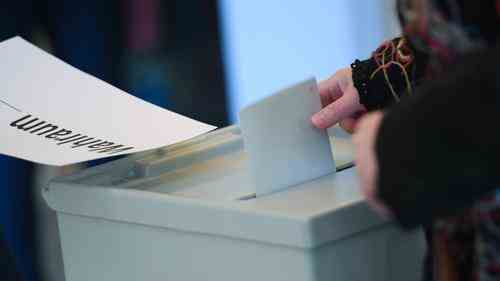It was an unusual election campaign in many respects. This was due to the still noticeable effects of the pandemic – but above all to the Russian war of aggression in Ukraine. This war has certainly reduced the volume of the election campaign. But above all he has shifted the thematic focus somewhat. Away from the purely Saarland topics – towards, for example, the increased energy and petrol prices.
An election campaign without fundamental differences in content
In any case, it would probably not have been an election campaign of loud noises, of fundamentally different programs and projects. The programs, especially those of the CDU and SPD, differ over long stretches, primarily in the details. G9 or the abolition of daycare fees – major issues on which the two current governing parties could not previously agree were cleared up quite early in the election campaign. It was also not discussed whether the expansion of renewable energies is necessary, but whether wind turbines should also be built in the forest or not.
The main reason for this is that it is undisputed what challenges the state will be confronted with in the coming years – above all the structural change in the Saar economy and the preservation of jobs. In this respect, all parties are also behind new company settlements such as the SVolt battery factory – even if the Greens, among others, criticize the choice of location in Überherrn, but meanwhile no longer fundamentally reject it.
Focus on the duel for the state chancellery
“The decisive factor is who leads the country” – SPD top candidate Anke Rehlinger, the deputy prime minister who no longer wants to be deputy, has repeatedly emphasized this sentence. The election campaign – for a long time it seemed reduced to the duel for the state chancellery and thus to the duel between the incumbent Prime Minister Tobias Hans (CDU) and challenger Anke Rehlinger (SPD).
Shortly before the election, Rehlinger and the SPD are ahead in this duel. The official bonus of Prime Minister Hans – it seems to be more the bonus of his deputy. In the direct election question, challenger Rehlinger has done significantly better than the incumbent since February. In addition, the survey suggests that the growing dissatisfaction with the work of the state government is primarily going home with the CDU part of the state government, even if the SPD has been part of this state government for the past five years. Most recently, the level of satisfaction with government work had improved slightly again.
For incumbent Tobias Hans, whom Annegret Kramp-Karrenbauer appointed as her successor in 2018, everything is at stake. But for Rehlinger, too, the election is the second attempt at the state chancellery – and the good poll numbers bring with them a certain pressure of expectations.
The location of the small parties
The intensification of the duel for the state chancellery is a problem for the smaller parties – but at the same time it is largely due to their situation. According to the polls, the AfD is the only party that is more or less certain to make it into the state parliament with six percent – a party in which a group of members withdrew their own state list just to prevent an unwelcome top candidate. Greens and FDP are each at five percent, the left at four – and would therefore no longer be represented in parliament after 13 years.
With the Greens and Left, the situation is largely homegrown. Although the Greens appear united in the election campaign, it cannot be ruled out that the violent disputes of the past year will break out again after the election. The long-standing power struggle between party co-founder Oskar Lafontaine – who was last head of the state parliamentary group – and state leader Thomas Lutze has got to the core of the Left Party.
Shortly before the election, Lafontaine had finally turned his back on the left. The final point of contention – and perhaps the starting point for years of extra-parliamentary opposition for a party that has always had strong results compared to the other West German states on the Saar.
And the FDP? As for the Greens, the Saarland is not an easy place for the Liberals either. After Jamaica’s exit ten years ago, the party has caught on and is slowly fighting back from its position on the brink of political insignificance. The FDP appears with a mixture of optimism and realism – because the chance of re-entering the state parliament is within reach. Whether it will be enough is questionable.
A three-party parliament?
The state of the party landscape in Saarland makes a new edition of the GroKo in Saarland appear almost without alternative. Tobias Hans has been campaigning for months to continue the alliance – not surprising given the fact that this would be the only chance for the CDU to remain in government responsibility. Anke Rehlinger, on the other hand, expresses her sympathy for grand coalitions, but does not rule out other alliances. Your condition: stability.
It is questionable whether, from Rehlinger’s point of view, this would also be possible with a CDU, which – depending on the election result – would have to rearrange itself. But even with the Greens, the internal party dispute could break out again after the election.
In general, the question of which of the smaller parties will even make it into the state parliament should be decisive. And so after the election, the already more than comfortable majority of the Saar-GroKo could be cemented, possibly with the AfD as the only opposition party in the state parliament. The state elections could also become a challenge for parliamentarism in the Saar.

